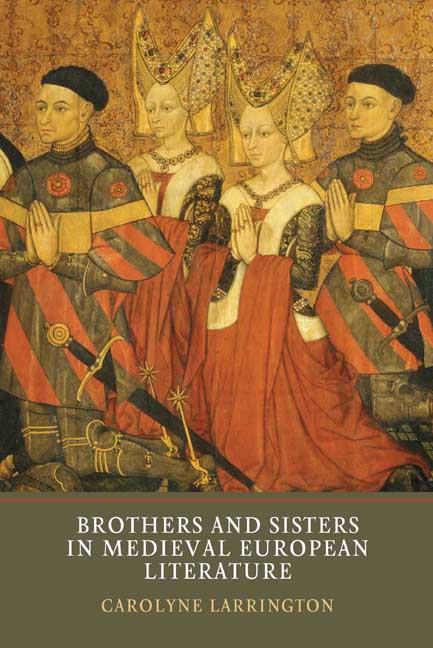Book contents
- Frontmatter
- Dedication
- Contents
- Acknowledgements
- Abbreviations
- Introduction
- 1 The Medieval Sibling in History
- 2 ‘Berr er hverr á bakinu nema sér bróður eigi’: Fraternal Love and Loyalty
- 3 ‘Io v’ho cara quanto sorella si dee avere’: Sisters, and their Brothers
- 4 ‘Næs þæt andæges nið’: Fraternal Hatreds
- 5 ‘Te souviegne de ce que je suis ta seur’: Sisters and Hostility
- 6 ‘The king’s dochter gaes wi child to her brither’: Sibling Incest
- 7 ‘So wil ich dir ce wibe mine swester gebn’: When Siblings Marry
- 8 ‘Trewethes togider that gun plight’: Fictive Siblings
- Conclusion
- Bibliography
- Index
5 - ‘Te souviegne de ce que je suis ta seur’: Sisters and Hostility
Published online by Cambridge University Press: 08 May 2021
- Frontmatter
- Dedication
- Contents
- Acknowledgements
- Abbreviations
- Introduction
- 1 The Medieval Sibling in History
- 2 ‘Berr er hverr á bakinu nema sér bróður eigi’: Fraternal Love and Loyalty
- 3 ‘Io v’ho cara quanto sorella si dee avere’: Sisters, and their Brothers
- 4 ‘Næs þæt andæges nið’: Fraternal Hatreds
- 5 ‘Te souviegne de ce que je suis ta seur’: Sisters and Hostility
- 6 ‘The king’s dochter gaes wi child to her brither’: Sibling Incest
- 7 ‘So wil ich dir ce wibe mine swester gebn’: When Siblings Marry
- 8 ‘Trewethes togider that gun plight’: Fictive Siblings
- Conclusion
- Bibliography
- Index
Summary
Introduction
Quarrels between sisters in medieval narratives are not so different from those between brothers; they range in scale from petty rivalries to conflicts which affect the destinies of outsiders beyond the family group, even – in a couple of texts – determining rule in Arthur's Britain. As suggested in chapter three, the relative interchangeability of sisters, and the fact that similar adult lives, centring on marriage and motherhood, lie ahead of girls means that they are less often depicted as antagonizing one another through such common fraternal strategies as counter-identification or rejection. As among brothers, the surface motivations for sisterly disputes are most frequently sexual rivalry or inheritance claims, but girls can fall out with one another over less substantial matters: sibling competitiveness can manifest itself at an early age. In his late-twelfth-century collection of exemplary stories, Caesarius of Heisterbach relates a delightful story of two little girls being educated in a monastery of his order in Frisia. The two sisters are highly competitive in the classroom, but one falls ill. Fearing that she was lagging behind in her studies while her sister was making great progress, the poorly child asked to see the prioress and offered to ask her mother for six denarii which she would give to the prioress if she would suspend her sister's studies until the patient was well enough to study again. The prioress, Caesarius reports, laughed at this, but was impressed by the little scholar's enthusiasm. Just so, the rivalries between older pairs of sisters often seem petty and spiteful at the level of attack and response, but such quarrels function as proxies for female anxieties about extremely serious issues.
Quarrelling over Gawain
Gawain's knightly demeanour, and that of his companions, becomes a bone of contention between sisters in three related Arthurian texts. The ostensible proposition is whether a man's worth can be judged by his appearance: a group of ladies, including two sisters, gaze from afar at unknown knights and leap to conclusions about their courage and social status. The fullest and most dramatic version of the sisters’ quarrel occurs in Heinrich von den Türlin's early-thirteenth-century romance Diu Crône.
- Type
- Chapter
- Information
- Brothers and Sisters in Medieval European Literature , pp. 129 - 154Publisher: Boydell & BrewerPrint publication year: 2015



